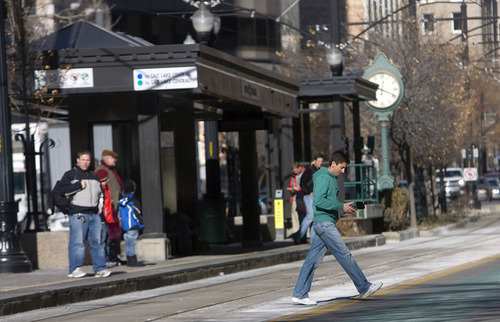This is an archived article that was published on sltrib.com in 2012, and information in the article may be outdated. It is provided only for personal research purposes and may not be reprinted.
Legislators slammed the brakes Wednesday on a Utah Transit Authority request to make "distracted walking" around railroads a violation of state law.
"You can't legislate [not being] stupid," said Rep. Craig Frank, R-Pleasant Grove. "This is way out of bounds. I'm surprised we have the guts to look at stuff like this."
Most of the Transportation Interim Committee agreed, and voted 11-4 to reject adopting UTA's proposal as a committee bill. However, Sen. Karen Mayne, D-West Valley City, a former UTA board member, said she will continue to work on a measure.
Earlier this year, UTA adopted an ordinance to allow $50 civil fines for distracted walking around trains — for such offenses as talking on cell phones, listening to music with headphones or texting. But if people choose not to pay the fines, the worst UTA could do is ban them from using its system. Sen. Daniel Thatcher, R-West Valley City, worried that outlawing such behavior in the state code could potentially put violators in jail, and asked, "Is that something we want to do?" It could also put more teeth into the power to collect fines.
But UTA general counsel Bruce Jones said the agency does not seek to raise money by writing tickets, but to heighten awareness and improve safety at a time that accidents have increased dramatically.
Still, Rep. Val Peterson, R-Orem, said, "this is overreaching, and pretty soon we're going to have a law for everything we do in society."
UTA also asked lawmakers to start considering a potential law that would force cars to yield to transit buses signaling to re-enter traffic. Jones said it would help clarify who has the right of way, reduce accidents and improve traffic flow. UTA has not drafted a bill yet on the issue.
Rep. Ken Sumsion, R-American Fork, said he isn't sure that is needed, and buses simply need to follow the same rules as other vehicles. He said the state would probably do better to fund an advertising campaign to push common courtesy among drivers.
UTA did manage to gain committee support to write a bill on another proposal — to prevent public release of data about where and when individuals travel in its system.
UTA is moving toward a distance-based fare system, which would track when individuals enter and leave its system and charge fares accordingly. Some tap-on, tap-off passes now compile the same travel data.
Jones said UTA has received some open-records law requests for such data from employers and private investigators trying to track people, but the agency wants to keep it private. He noted the Legislature last year passed a bill to keep private data about people using toll readers for express lanes on freeways.



